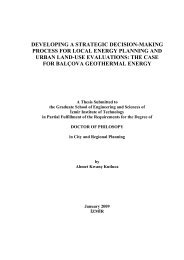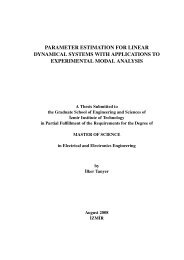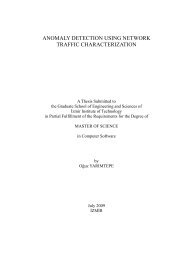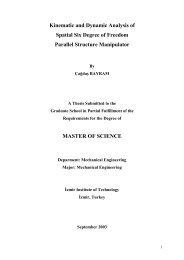a critical evaluation on the concept of justice in planning process
a critical evaluation on the concept of justice in planning process
a critical evaluation on the concept of justice in planning process
Create successful ePaper yourself
Turn your PDF publications into a flip-book with our unique Google optimized e-Paper software.
With<strong>in</strong> this framework, Rawls alters <strong>the</strong> utilitarian mean<strong>in</strong>g <strong>of</strong> <strong>the</strong> c<strong>on</strong>cept <strong>of</strong><br />
public <strong>in</strong>terest/ benefit as “greater happ<strong>in</strong>ess <strong>of</strong> <strong>the</strong> greater number to reflect <strong>the</strong> wishes<br />
and advantages <strong>of</strong> majority”. In Rawlsian terms, public <strong>in</strong>terest/benefit lies <strong>in</strong><br />
<strong>in</strong>creas<strong>in</strong>g <strong>the</strong> advantages <strong>of</strong> <strong>the</strong> most disadvantageous <strong>on</strong>es (McC<strong>on</strong>nell;1995;38).<br />
Right:<br />
Accord<strong>in</strong>g to Rawls, every <strong>in</strong>dividual has <strong>in</strong>dispensable rights <strong>of</strong> his/her own.<br />
However, <strong>in</strong> case <strong>the</strong>se rights cause <strong>the</strong> socially most disadvantageous and less free<br />
<strong>on</strong>es with least rights to become more advantageous, <strong>the</strong>n rights can be aband<strong>on</strong>ed.<br />
As manifest, <strong>the</strong> most important emphasis accompany<strong>in</strong>g <strong>the</strong> comp<strong>on</strong>ents <strong>of</strong><br />
<strong>justice</strong> <strong>in</strong> Rawls’s framework, namely, liberty, equality, right and <strong>in</strong>terest, is <strong>on</strong> “just<br />
aband<strong>on</strong>ment <strong>of</strong> advantages <strong>of</strong> <strong>the</strong> least advantaged <strong>on</strong>es”. In order not to live such<br />
great <strong>in</strong>equalities as <strong>of</strong> today, <strong>the</strong> <strong>in</strong>dividuals accept all <strong>the</strong>se pr<strong>in</strong>ciples with <strong>the</strong><br />
recogniti<strong>on</strong> that <strong>the</strong>y can be able to reach a much better society via <strong>the</strong>ir renunciati<strong>on</strong>s<br />
(aband<strong>on</strong>ments). In this approach that comprises abstract series <strong>of</strong> pr<strong>in</strong>ciples,<br />
universality is emphasized as <strong>in</strong>dependent from specific time and space.<br />
The <strong>in</strong>stituti<strong>on</strong>s depicted as what balances and implements <strong>the</strong> social order,<br />
which is created by such assents and pr<strong>in</strong>ciples, is promoted through adopti<strong>on</strong> <strong>of</strong> a<br />
comprehensive state. These <strong>in</strong>stituti<strong>on</strong>s c<strong>on</strong>sist <strong>of</strong> <strong>the</strong> c<strong>on</strong>stituti<strong>on</strong>al and legal system as<br />
compris<strong>in</strong>g all <strong>the</strong> mechanisms related with its operati<strong>on</strong>.<br />
This framework presented by Rawls renders re-c<strong>on</strong>siderati<strong>on</strong> <strong>of</strong> distributi<strong>on</strong> and<br />
re-distributi<strong>on</strong> mechanisms (that is, <strong>of</strong> all <strong>in</strong>stituti<strong>on</strong>s and mechanisms <strong>of</strong> regulati<strong>on</strong>)<br />
targeted at reducti<strong>on</strong> <strong>of</strong> <strong>in</strong>equalities all as necessary. However, <strong>the</strong> fundamental problem<br />
lies <strong>in</strong> def<strong>in</strong>iti<strong>on</strong> <strong>of</strong> need, which is reached by c<strong>on</strong>sensus <strong>in</strong> implementati<strong>on</strong> <strong>of</strong> <strong>the</strong>se<br />
pr<strong>in</strong>ciples presented <strong>in</strong> a lexical order, to change also by society, culture, time and<br />
space. Never<strong>the</strong>less, it is possible to atta<strong>in</strong>, <strong>in</strong> m<strong>in</strong>imum standards, universally<br />
acceptable criteria <strong>in</strong> such issues as health, shelter, security and educati<strong>on</strong>.<br />
With <strong>the</strong> emphases he has put <strong>on</strong> <strong>the</strong> priority given to pr<strong>in</strong>ciples and <strong>justice</strong>,<br />
Rawls appears to have reached his target c<strong>on</strong>cern<strong>in</strong>g <strong>the</strong> implementable pr<strong>in</strong>ciples <strong>of</strong><br />
liberal society by stay<strong>in</strong>g with<strong>in</strong> <strong>the</strong> liberal traditi<strong>on</strong>s.<br />
IN RESULT, <strong>in</strong> “<strong>justice</strong> as fairness” approach where Rawls has presented a new<br />
perspective to <strong>the</strong> classical liberal pr<strong>in</strong>ciples <strong>of</strong> <strong>justice</strong>, he defends:<br />
1. that equality shall be c<strong>on</strong>sidered <strong>in</strong> a need-based manner as to provide for advantages<br />
to <strong>the</strong> least advantaged <strong>on</strong>es,<br />
30
















